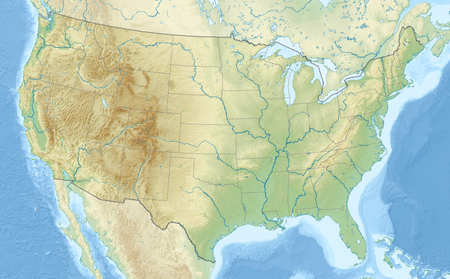Havasu National Wildlife Refuge
This article includes a list of general references, but it lacks sufficient corresponding inline citations. (April 2017) |
| Havasu National Wildlife Refuge | |
|---|---|
IUCN category IV (habitat/species management area) | |
 | |
| Location | Mohave County, Arizona / San Bernardino County, California, U.S. |
| Nearest city | Needles, California |
| Coordinates | 34°36′34″N 114°25′02″W / 34.6095812°N 114.4173321°W |
| Area | 37,515 acres (151.82 km2) |
| Established | 1941 |
| Governing body | U.S. Fish and Wildlife Service |
| Website | www |
Havasu National Wildlife Refuge is a U.S. National Wildlife Refuge on the lower Colorado River in Arizona and California. It preserves habitat for desert bighorn sheep, the endangered southwestern willow flycatcher, and other animals. The refuge protects 30 river miles - 300 miles (480 km) of shoreline - from Needles, California, to Lake Havasu City, Arizona. One of the last remaining natural stretches of the lower Colorado River flows through the 20-mile-long (32 km) Topock Gorge.
Species
[edit]Animal species that inhabit this refuge include peregrine falcon, coyote, fox, desert bighorn sheep, greater roadrunner, bobcat, and cougar. Thousands of bats emerge from historic mines and razorback suckers swim in the back of Beal Lake.
Support
[edit]A large river in a dry, hot land attracts wildlife and people like a powerful magnet. Many thousands of visitors annually flock to the refuge to boat through the Topock Gorge, watch waterbirds in Topock Marsh, or hike to the Havasu Wilderness Area.
A non-profit membership organization supports and advocates for the refuge. It assists refuge staff with several of the refuge annual events, help to obtain grants to support refuge projects, conducts fund-raising activities to support environmental education programs, and helps the United States Fish and Wildlife Service operate and maintain the refuge facilities and programs by providing volunteer labor.
Locations
[edit]| Fivemile Landing, Arizona | |
|---|---|
 | |
| Coordinates | 34°47′43″N 114°30′21″W / 34.79528°N 114.50583°W |
| Elevation | 463 ft (141 m)[1] |
| GNIS feature ID | 24417 |
Five Mile Landing
[edit]To aid visitors to the Colorado River, The U.S. Fish and Wildlife Service has allowed a private contractor to operate a boat, canoe, campsite, RV site, and a store in the refuge at Five-Mile Landing, a 35-acre (14 ha) site with boat ramps at Topock Marsh in the northern part of the refuge.[2]
Topock Marsh
[edit]The Topock Marsh is one of the larger birding sites found in the Lower Colorado River Valley, between Hoover Dam and the Colorado River Delta.
Catfish Paradise
[edit]Catfish Paradise is an area located at the southern end of the Topock Marsh.[3] Many species living in the area include Bullfrogs, Carp, Sunfish, Catfish (Channel), Crappie, Largemouth Bass, and Tilapia.
See also
[edit]- List of National Wildlife Refuges
- List of wilderness areas of the United States
- List of Wildlife Refuges of the Lower Colorado River Valley
- Sonoran Desert topics index
References
[edit]- ^ "Feature Detail Report for: Fivemile Landing". Geographic Names Information System. United States Geological Survey, United States Department of the Interior.
- ^ "Concessionaire sought for Five-Mile landing operation". Needles Desert Stat. Needles, California. July 26, 2006. p. 8.
- ^ U.S. Geological Survey Geographic Names Information System: Havasu National Wildlife Refuge
This article incorporates public domain material from websites or documents of the United States Fish and Wildlife Service.
External links
[edit]- IUCN Category IV
- Lower Colorado River Valley
- National Wildlife Refuges in Arizona
- National Wildlife Refuges in California
- Protected areas of Mohave County, Arizona
- Protected areas of San Bernardino County, California
- Protected areas of the Colorado Desert
- Protected areas of the Mojave Desert
- Protected areas of the Sonoran Desert
- Protected areas on the Colorado River
- Wilderness areas within the Lower Colorado River Valley
